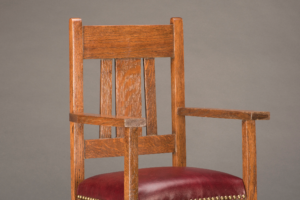The Harry Ransom Center will display the exhibit The Rise of Everyday Design: The Arts and Crafts Movement in Britain and America, from Feb. 9 to July 14. The exhibit showcases 19th and 20th century American and British artists and addresses their continued influence on home decor.
“The exhibition’s distinction is its emphasis on the Arts and Crafts’ transformation from a movement that made handcrafted objects for the well-to-do to a popular phenomenon of mass- manufactured, inexpensive pieces sold through retail outlets like Sears, Roebuck & Co.,” said Monica Penick, the exhibition’s curator. “The Arts and Crafts idea persisted long after it is usually said to have expired, well into the 1950s and 1960s. The Ransom Center, with its wide-ranging collections of both British and American art, architecture and design, is ideally suited to tell this story.”
This exhibition will present this evolving movement through more than 250 items and a variety of mediums. It will display books, drawings, furniture pieces, decorative arts objects, photographs and advertising ephemera.
![Harwell Hamilton Harris. [Weston] Havens House, Berkeley, California, 1941, rendering dated 1939. Crayon and pencil on trace paper adhered to board. 33 x 42.5 cm. Harwell Hamilton Papers, Alexander Architectural Archives. Courtesy University of Texas at Austin.](https://news.utexas.edu/wp-content/uploads/2019/02/txu-aaa-hhh00084-FIG200-EDB137_300dpi-300x200-c-default.png)


The pieces illustrate how the Arts and Crafts movement resonated and expanded. Some of the works go beyond home-interior concerns and involve landscape architecture and city planning. There are drawings of homes, blueprints and detailed descriptions of preferred room distributions and decor arrangements. There are also photographs and drawings of the artists.
The artists promoted this style of arts and crafts as a means to improve the daily lives of those affected by the Industrial Age. During the 19th and 20th centuries, their pieces were typically handmade and costly. The aesthetics persisted even as the production processes changed: By the middle of the 20th century, large retailers carried mass-produced arts and crafts items in their stores. Walking through The Rise of Everyday Design will reveal how the Arts and Crafts movement continues to shape our spaces.
This story originally appeared in Texas Connect, a publication for staff and faculty, January 30, 2019.
